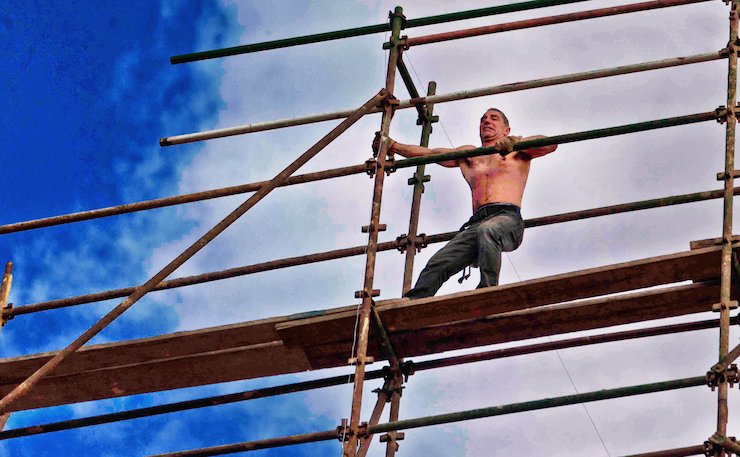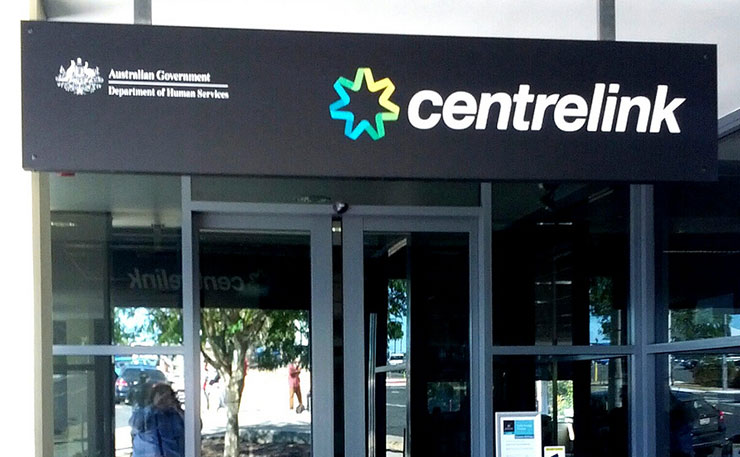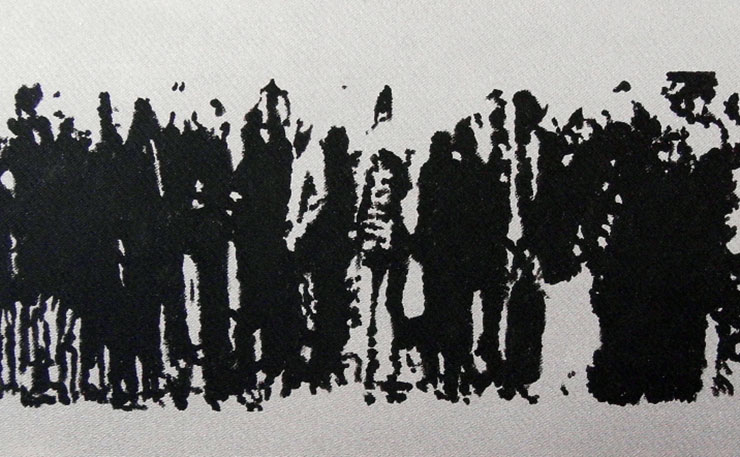Nelly Thomas has been a self-employed comedian for 15 years. Prior to that she worked in waged jobs. If you want to know what a fully deregulated labour market looks like, Thomas says talk to a freelance artist, performer or writer.
Creative people are the canaries in the deregulated labour market mine.
There are a lot of difficult things about living on an indeterminate income. It took me about a decade to get used to the precarity of living gig-to-gig; of being at the whim of “the market”, booking agents and competition. I used to get to a point every November where I’d freak out because I’d have little or nothing booked in for the following year and I’d have to remind myself that the work would come.
Luckily for me, it almost always did. Not so for many of my peers, nor for many workers in Australia today.
There are significant difficulties that come with being self-employed. Chief among them is that no-one brings a cake to the staff meeting on your birthday (on the upside, there are no staff meetings) but personally, I think the worst is how open to exploitation it leaves you.
When you’re income is insecure you’re far more likely to bargain your fees, wages and conditions down. That’s common sense, no? There’s often haggling over artist’s fees, but when your rent is dependant on getting the gig, accepting exploitative – or at least insulting – fees and conditions is far more likely.
I could tell you many stories about shitty working conditions I’ve endured, but one stands out. I remember in my early days I showed up to a pro-bono Union gig (the irony) only to find that they had not arranged a microphone or stage for the show.
I am a comedian. Who talks. Into a microphone. From a stage.
When I enquired after both they handed me a milk crate and a megaphone.
A MILK CRATE AND A MEGAPHONE PEOPLE!
I wish I was embellishing.
Many self-employed artists have similar stories. It should tell you something that there are venues in comedy festivals all around the world called things like “The Cloakroom” and “Backstage”. No metaphor there, they are literally storage areas.
The last time I performed at the Edinburgh Fringe my venue was so hot I had a towel on stage to mop the sweat off my ARMS AND LEGS (the face – who cares!) and on one memorable occasion a woman passed out in the front row.
I’m funny, but not that funny.
Corporate and NGO gigs can be even worse. It’s not at all uncommon for comedians and other performers to be offered “a nice meal” or a “drink card” as payment. Guess what guys, I have those things at home.
In short, when you live in a country like Australia where creative labour is undervalued, exploitation is common.
When you live in 2017 and every writer and his dog is a blogger and every performer and her dog wants exposure, it’s worse again.
Free and undervalued creative labour is bad for artists and The Arts in general – in my view we should only ever offer reduced rates for charitable purposes and even then the conditions should be reasonable and professional – but one thing we can learn from freelance artists is what happens when the collective labour force is individualised.
Think casualization, contract labour and de-unionisation.
Think 2017.
Whereas the precarity of casualisation and contract labour were once only really a major feature of the entertainment and hospitality sectors, they’re now widespread – even in white-collar jobs.

The Conservative Mantra of “study hard and get a good job” simply doesn’t stack up anymore. I have a mate in his mid-forties who is a white male with a PhD who can’t get a car loan because his contract employment is too unstable. We all know IT professionals arm-wrestling each other over 10-month contracts and university lecturers scratching each other’s eyes out for 2-day a week teaching positions. They did study, they do have “good jobs” and they still don’t have financial security.
The white-collar worker is now learning what the contract cleaner and factory-hand have always known: without job security you take what you can get or leave.
In addition, unemployment in Australia is currently about 5.7 per cent. The underemployment rate is much higher. There are a lot of people looking for work – across all income brackets – and some of them are desperate and willing to do almost whatever it takes to earn a crust.
All this adds up to an enormous amount of power for employers.
Yes, there are regulations around wages and conditions in Australia (that are often ignored) but that does not mitigate the fact that with so many people looking for work, employers know their employees can be replaced. To put it another way – and from a worker’s point of view – who’s going to complain when they know there’s someone waiting in line to take their job? I can assure you that a lot of performers don’t or can’t.
Do we really want that for our workforce writ large?
To pivot slightly, this is one of the many reasons I’m drawn to the concept of the Universal Wage or Universal Basic Income (UBI).
For those not familiar with the UBI (apparently one of the Big Ideas of 2016, although it has been around longer than that) it essentially involves the government providing unconditional income to every citizen. Unlike “The Dole” the UBI is designed to allow all citizens to comfortably cover the basics of life and is not means tested or dependent on filling out your Job Seeker Diary. It is a guarantee that as a citizen you can clothe, house and feed yourself.
If you want – as most people do – to earn money on top of that (don’t believe the Conservative idea that humans won’t contribute if they don’t have to) you can. In other words, and as a compromise position for the free market enthusiasts, you still create wealth. Ownership of private property and capital is still a thing and you can still be richer than everyone else. But, if you can’t or won’t work you can still live in relative financial security and with dignity.
The idea of a UBI is now gaining some mainstream traction.
For some it is a Human Rights issue and these advocates argue that all citizens have the right to a decent life. WHICH IS OBVIOUSLY RADICAL.
Others (like Mark Zuckerberg and Elon Musk) consider it a kind of “freedom to think” Utopia. A lot of technology enthusiasts take this line as they see the UBI as potentially justifying or at least off-setting the ongoing “robotocisation” of work and society. Their argument is that roboticisation is inevitable and offers an escape from the drudgery of low-skilled jobs like building cars or checking people in at airports. I’m not entirely convinced – I think meaning and purpose can be found in a whole range of jobs, including so-called low-skilled ones – but that’s a whole other article. I do think Zuckerberg and Musk make some good points but personally, I am drawn to the UBI model for different reasons.
The first is that it gives those living in dire poverty some power. Tick.
Under the UBI model, the poor have an actual living wage (as opposed to current welfare benefits). Everyone can pay for the basic necessities of life relatively comfortably and don’t have to live in constant fear that their income will be cut off. This, in turn, leads to far greater housing security, better health outcomes and significantly reduced homelessness. In short, to a much better society.
Secondly, the “working poor” gain power. Tick again.
Currently, low-paid workers are extremely vulnerable to exploitation because they fear their hours being cut (and they’re barely getting by as it is), plus they’re terrified of unemployment because they know it’s near to impossible to live in most parts of Australia on benefits.
If the working poor were provided a living wage they’d have more options to leave jobs that were unsuitable, underpaid, unsafe or in some way exploitative – an apprentice being hazed with a broom stick or a security guard being offered $10 per hour could conceivably say NO THANKS.
Parents and others with caring responsibilities could work part-time without slipping into dire poverty and the free work done by countless volunteers would be properly supported. Keep on ticking.
Finally, a Universal Wage potentially removes the need for Centrelink to exist.
WOOOOTTTTT!
Sounds like a joke but I am deadly serious.

HOW MUCH BLOODY MISERY IS CAUSED BY CENTRELINK? FOR RECIPIENTS AND THE POOR SOULS WHO WORK THERE?
This ridiculously complex bureaucratic behemoth – used by various governments to demonise people on welfare benefits – could be largely eradicated if the UBI was adopted. You’d need a smaller body to administer payments but if everyone was given the same, unconditional amount of money there’d be no need for filling out forms, spying on people or robo-calling them about fake debt.
No more people doing “courses” for jobs that simply aren’t there.
No more pretending that a great CV and pleasant speaking voice will solve unemployment in The Valley.
No more pensioners on Today Tonight!
Imagine if that all was just unnecessary.
I was doing a comedy workshop with a group of women with disabilities recently and they all had shocking tales about going into Centrelink to “prove” their “disability status”. I mean they literally had to go in regularly – no small feat for some of them – and prove they were still disabled and/or disabled enough to qualify for income support.
There was a woman who was asked to prove that Cerebral Palsy is a life-long condition, one who had to point out that missing arms makes typing jobs hard and others who had to explain that long-term unemployment due to “hospitalisation for mental health issues” isn’t a good look in a cover letter.
Honestly, can you imagine the indignity of having to justify to a (usually) able-bodied person why job-seeking is made hard by crip prejudice? It beggars belief.
There are countless other examples of similar harassment – and yes, that is the word for it.
People with far more economic nous than me have shown how the concept of the UBI can work. Many Economists are wary of the idea but mainly because it’s usually discussed in the American context and as a replacement for universal healthcare and education.
If the UBI was introduced in Australia the safety net would be increased and supported by a reduction in bureaucracy costs, as well as the enormous cost savings in health and wellbeing benefits from all citizens being housed, fed, secure and respected.
What an idea: people in need of society’s support like job seekers, carers, veterans, single parents and people with disabilities actually feeling respected.
Yes, taxes would have to go up, and yes rich people would have to get the UBI too, even though they don’t need it. There’s no way around that. If you start means-testing it, it’s not universal anymore and you basically end up with Centrelink again.
For these and other reasons the universal wage is currently unpalatable politically. But as massive job losses bite, industries collapse, whole towns and regions are decimated, the gap between rich and poor grows ever wider and, as we’re forced into an ever-increasing culture of self-service, it’s gaining traction.
If Trump tells us anything at all it’s that the mainstream is imploding.
What we’re doing isn’t working.
Poor people know they’re poor and they don’t like it. History tells us that doesn’t always go so well.
We need a radical idea.
This just might be it.
Donate To New Matilda
New Matilda is a small, independent media outlet. We survive through reader contributions, and never losing a lawsuit. If you got something from this article, giving something back helps us to continue speaking truth to power. Every little bit counts.






